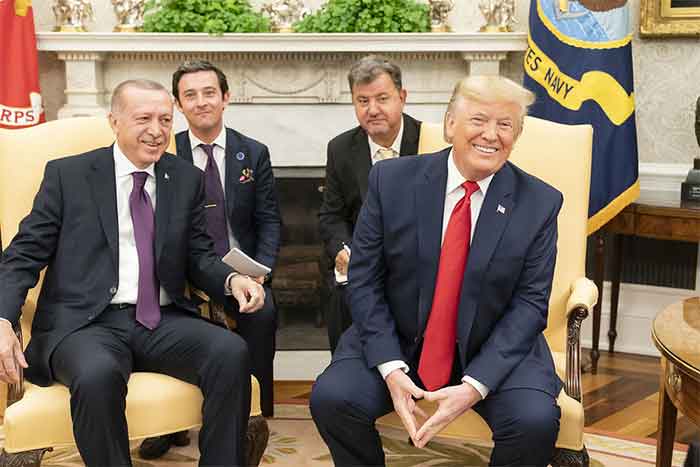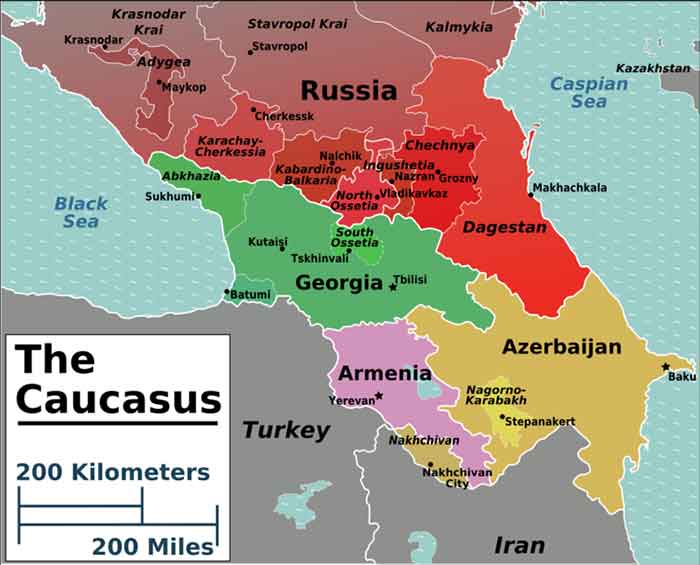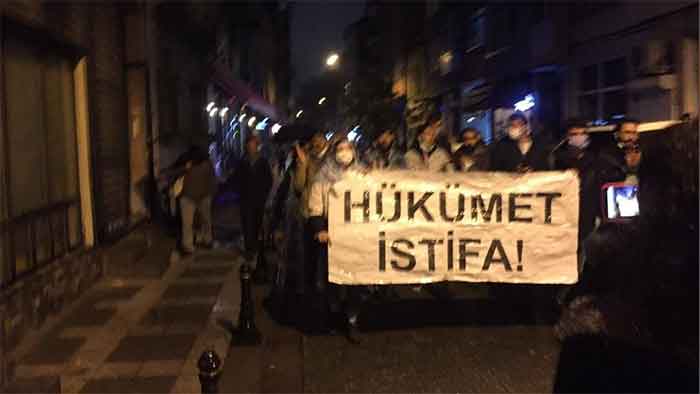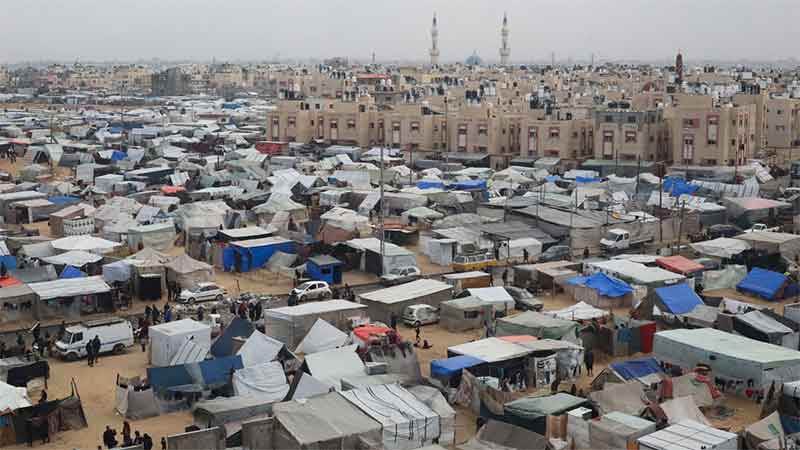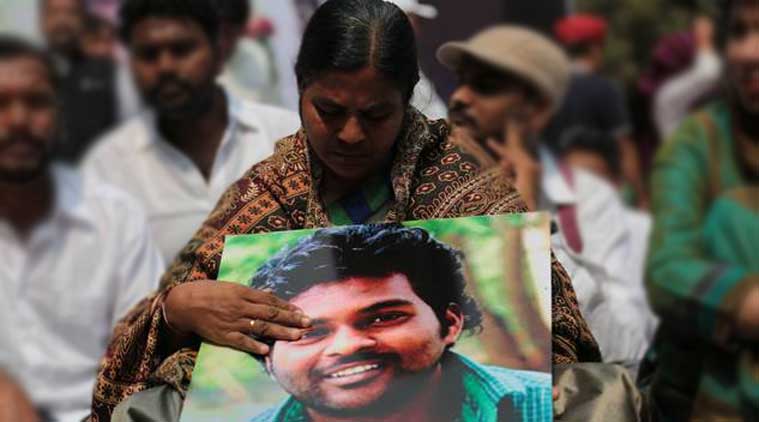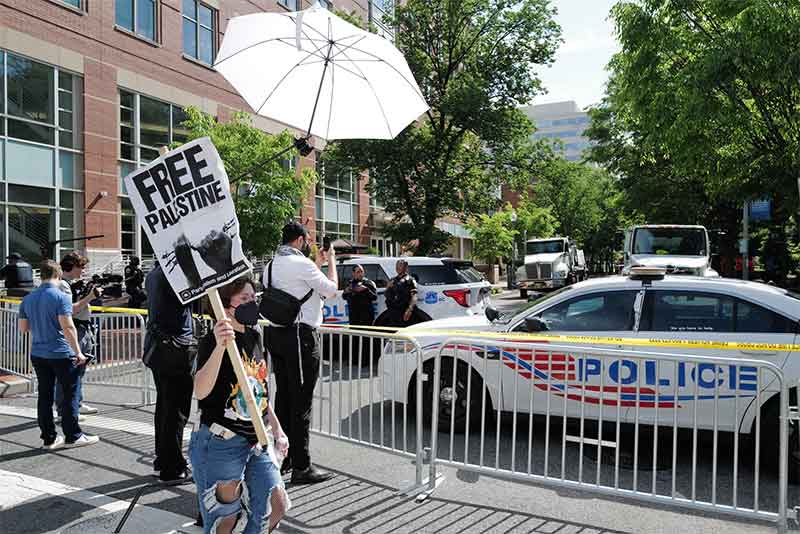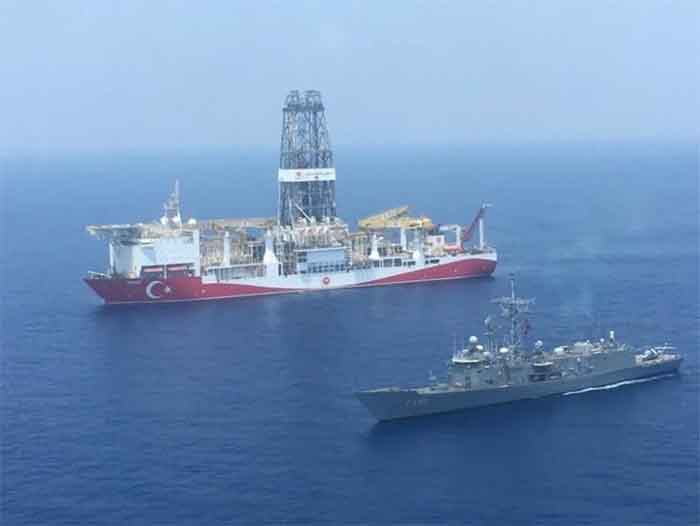
Turkish President Recep Tayyip Erdogan has threatened reprisals if anyone attacks the ship surveying disputed waters in the Mediterranean for oil and gas, after two French jets flew nearby during an exercise with the Greek fleet.
“We said that if you attack our Oruc Reis you will pay a high price, and they got their first answer today,” Erdogan said on Thursday in a speech in Ankara, without offering any details as to what might have happened.
The vessel, named after a 16th-century Ottoman pirate, started survey work earlier this week near the island of Kastellorizo, which belongs to Greece but is located near the southern coast of Turkey’s Antalya province.
French President Emmanuel Macron announced on Wednesday he would be sending additional military forces into the eastern Mediterranean in support of fellow EU and NATO member Greece. Macron also called for Turkey to stop the survey and resolve the issue with Athens through dialogue.
On Thursday, Greek media reported that two French Rafale jets flew over the Oruc Reis and its Turkish navy escorts, as they participated in joint exercises with the Hellenic Navy.
Two French vessels, the frigate La Fayette and helicopter carrier Tonnerre, took part in the drills alongside four Greek frigates: Spetsai, Aegean, Koundouriotis and Limnos.
Limnos was the ship reportedly involved in a collision with the Turkish navy frigate Kemal Reis – one of Oruc Reis’s military escorts – on Wednesday morning.
Greek media reported that the clash left several Greek sailors injured, but rendered the Turkish vessel “inoperable,” which Ankara denied.
Turkey and Greece last fought a war between 1919 and 1922, which ended in a mass exodus of Greeks from the present-day territory of the Turkish republic. In 1974, Ankara invaded Cyprus and backed a breakaway ethnic Turkish state, after the Cypriot government declared intent to unite with Greece. The island nation remains divided to this day.
Both Turkey and Greece are NATO members, but Athens is also a member of the EU, while Ankara is not.
“We have told Greece if you attack our Oruc Reis, you will pay a heavy price. And they got their first answer today,” Erdogan told fellow AKP party members in Ankara, without going into further detail.
Turkey on Monday sent the vessel to explore off the coast of the Greek island of Kastellorizo, accompanied by several Navy ships. Greece responded by sending its own military vessels to monitor the situation.
Greece and Turkey have been at loggerheads over energy resources since the discovery of hydrocarbon reserves in the eastern Mediterranean. Greece and the European Union claim Turkey is illegally drilling in the region, but Turkey claims the area is within its exclusive economic zone.
Turkey and Greece, NATO allies, vehemently disagree over overlapping claims to hydrocarbon resources in the region based on conflicting views on the extent of their continental shelves in waters dotted with mostly Greek islands. The gas-rich waters of the region are also a frequent source of dispute between Turkey, Cyprus and Israel.
The island of Kastellorizo, which is about 2km off Turkey’s southern coast and 570km from the Greek mainland, is a particular source of Turkish frustration.
Greece’s claim to the waters around Kastellorizo is based on a UN maritime convention endorsed by many countries, but not Turkey.
Athens maintains its islands – no matter how small – have their own continental shelves; Ankara argues that, if upheld, the Aegean would effectively be turned into a Greek lake, which, say Turkish diplomats, is utterly unacceptable to a country that sees itself as a regional power and has no intention of being left out of any energy bonanza.
Ankara said it would issue new exploration and drilling licenses in the eastern Mediterranean, while Athens has demanded the immediate withdrawal of the Oruc Reis from the area.
Erdogan-Merkel talk
Earlier on Thursday, Erdogan held talks with German Chancellor Angela Merkel, saying “he prefers disputes in the eastern Mediterranean are resolved within the framework of international law and on the basis of fairness and dialogue,” the Turkish presidency said in a statement.
Merkel brokered talks between Turkey and Greece in July in which Ankara agreed to temporarily pause drilling in the region. However, it resumed energy exploration Monday after Greece reached a deal with Egypt over rights to drill for oil and gas in the area.
EU foreign ministers are due to discuss the issue during a special video conference on Friday.
France to boost military presence in eastern Mediterranean
France will boost its military presence in the eastern Mediterranean amid an escalating standoff between Greece and Turkey over oil and gas exploration in disputed waters.
France will send two Rafale fighter jets and the naval frigate ‘Lafayette’ to the region as part of plans to increase its military presence, the armed forces ministry said on Thursday.
French President Emmanuel Macron called the situation in the eastern Mediterranean “worrying”, and urged Turkey to stop its “unilateral” prospecting and “allow a peaceful dialogue” between the neighboring NATO members.
“I have decided to temporarily reinforce the French military presence in the eastern Mediterranean in the coming days, in cooperation with European partners, including Greece,” Macron said on Twitter on Wednesday.
On Thursday, the French military conducted training exercises with Greek forces off the southern island of Crete, Greek defense sources told Reuters news agency, as the first manifestation of Macron’s support.
France’s armed forces ministry confirmed it was dispatching two Rafale fighter jets and a naval frigate to the eastern Mediterranean after Macron voiced grave concern over the situation in a call with Mitsotakis the previous day.
Turkey’s prospecting should “cease in order to allow a peaceful dialogue between the neighboring NATO members”, Macron tweeted in a strong statement, describing the situation as “preoccupying” and blaming Turkey’s “unilateral decisions” for mounting tensions.
“Emmanuel Macron is a true friend of Greece and a fervent defender of European values and international law,” Greek Prime Minister Kyriakos Mitsotakis tweeted, in French, after a call with the French president.
Macron’s office, in a statement, said France’s increased military presence in the region was aimed at monitoring the situation and marked Paris’ “determination to uphold international law”.
Last month, the French leader called for EU sanctions against Turkey for what he described as “violations” of Greek and Cypriot sovereignty over their territorial waters. Relations between Paris and Ankara have also frayed over the conflict in Libya.
‘Risk of an accident’
Mitsotakis in a statement urged Turkey to show “sense” and warned the showdown in the eastern Mediterranean could lead to a military accident.
“We are vigilantly looking forward to sense prevailing, at last, in our neighboring country so that dialogue may be re-initiated in good faith,” the prime minister said. “The risk of an accident lurks when so many military assets are gathered in such a contained area.”
Athens would not seek to escalate the situation, he said, but added: “No provocation will though go unanswered.”
Hulusi Akar, the Turkish defense minister, echoed the sentiment in an interview with the Reuters news agency.
“We want to reach political solutions through peaceful means in line with international laws,” he said, but warned Turkey would continue to defend its “rights, ties and interests” in coastal waters.
Greek Foreign Minister Nikos Dendias was due to fly to Israel on Thursday for talks, his office said, and will also address the issue with US Secretary of State Mike Pompeo in Vienna on Friday.
EU diplomacy chief Josep Borrell said the bloc’s foreign ministers would hold an extraordinary meeting on Friday to discuss the eastern Mediterranean, Lebanon and Belarus.
A similar crisis last month was averted after Turkey pulled the Oruc Reis back to hold talks with Greece and rotating EU chair Germany.
But the mood soured last week after Greece and Egypt signed an agreement to set up an exclusive economic zone in the region. The Turkish foreign ministry has said the Greece-Egypt agreement was “null and void”.
Egypt, Cyprus and Greece have likewise denounced a contentious deal, including a security agreement, signed last year between Ankara and the UN-recognized government in Libya.
Greek military put on high alert
Greece has placed its military forces on high alert, recalling its naval and air force officers from holiday, as tensions with Turkey over exploration of potentially lucrative offshore energy reserves escalate in the eastern Mediterranean.
Athens stepped up calls for Turkey to stop the “illegal” activities, intensifying a diplomatic offensive that has prompted the US, EU, France and Israel to express growing anxiety over the situation.
“Our country does not threaten [anyone], but nor can it be blackmailed,” the Greek prime minister, Mitsotakis, told the country on Wednesday night. “Let it be known to all: the risk of an accident lies in wait when so many military forces gather in a limited area.”
Greece’s foreign minister, Nikos Dendias, will also meet his US counterpart, Mike Pompeo, in Vienna on Friday for talks focusing on what Dendias described as “developments in the eastern Mediterranean in light of Turkey’s escalating violations of international legality”.
At the height of summer, with tourists once again heading to Greek island resorts and beaches, diplomats in Athens are eager the standoff is defused peacefully. But as warships coalesce, the specter of conflict being triggered by a miscalculated move is also real, analysts say.
The discovery of deep sea gas fields, first off Egypt and then Israel and Cyprus, has proved the eastern Mediterranean to be rich in natural resources – even if, in the case of Cyprus, hydrocarbons are still a long way from being extracted from the seabed.
Egypt and Israel have found enough gas reserves to become energy sufficient for the foreseeable future.
SIGN UP FOR COUNTERCURRENTS DAILY NEWSLETTER


